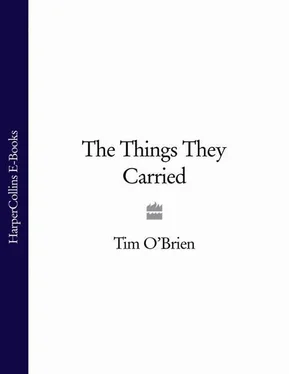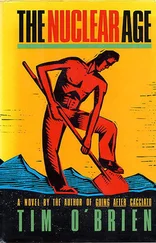I feel guilty sometimes. Forty-three years old and I’m still writing war stories. My daughter Kathleen tells me it’s an obsession, that I should write about a little girl who finds a million dollars and spends it all on a Shetland pony. In a way, I guess, she’s right: I should forget it. But the thing about remembering is that you don’t forget. You take your material where you find it, which is in your life, at the intersection of past and present. The memory-traffic feeds into a rotary up in your head, where it goes in circles for a while, then pretty soon imagination flows in and the traffic merges and shoots off down a thousand different streets. As a writer, all you can do is pick a street and go for the ride, putting things down as they come at you. That’s the real obsession. All those stories.
Not bloody stories, necessarily. Happy stories, too, and even a few peace stories.
Here’s a quick peace story:
A guy goes AWOL. Shacks up in Danang with a Red Cross nurse. It’s a great time – the nurse loves him to death – the guy gets whatever he wants whenever he wants it. The war’s over, he thinks. Just nookie and new angles. But then one day he rejoins his unit in the bush. Can’t wait to get back into action. Finally one of his buddies asks what happened with the nurse, why so hot for combat, and the guy says, ‘All that peace, man, it felt so good it hurt. I want to hurt it back.’
I remember Mitchell Sanders smiling as he told me that story. Most of it he made up, I’m sure, but even so it gave me a quick truth-goose. Because it’s all relative. You’re pinned down in some filthy hellhole of a paddy, getting your ass delivered to kingdom come, but then for a few seconds everything goes quiet and you look up and see the sun and a few puffy white clouds, and the immense serenity flashes against your eyeballs – the whole world gets rearranged – and even though you’re pinned down by a war you never felt more at peace.
What sticks to memory, often, are those odd little fragments that have no beginning and no end:
Norman Bowker lying on his back one night, watching the stars, then whispering to me, ‘I’ll tell you something, O’Brien. If I could have one wish, anything, I’d wish for my dad to write me a letter and say it’s okay if I don’t win any medals. That’s all my old man talks about, nothing else. How he can’t wait to see my goddamn medals.’
Or Kiowa teaching a rain dance to Rat Kiley and Dave Jensen, the three of them whooping and leaping around barefoot while a bunch of villagers looked on with a mixture of fascination and giggly horror. Afterward, Rat said, ‘So where’s the rain?’ and Kiowa said, ‘The earth is slow, but the buffalo is patient,’ and Rat thought about it and said, ‘Yeah, but where’s the rain?’
Or Ted Lavender adopting an orphan puppy – feeding it from a plastic spoon and carrying it in his rucksack until the day Azar strapped it to a Claymore antipersonnel mine and squeezed the firing device.
The average age in our platoon, I’d guess, was nineteen or twenty, and as a consequence things often took on a curiously playful atmosphere, like a sporting event at some exotic reform school. The competition could be lethal, yet there was a childlike exuberance to it all, lots of pranks and horseplay. Like when Azar blew away Ted Lavender’s puppy. ‘What’s everybody so upset about?’ Azar said. ‘I mean, Christ, I’m just a boy.’
I remember these things too.
The damp, fungal scent of an empty body bag.
A quarter moon rising over the nighttime paddies.
Henry Dobbins sitting in the twilight, sewing on his new bucksergeant stripes, quietly singing, ‘A tisket, a tasket, a green and yellow basket.’
A field of elephant grass weighted with wind, bowing under the stir of a helicopter’s blades, the grass dark and servile, bending low, but then rising straight again when the chopper went away.
A red clay trail outside the village of My Khe.
A hand grenade.
A slim, dead, dainty young man of about twenty.
Kiowa saying, ‘No choice, Tim. What else could you do?’
Kiowa saying, ‘Right?’
Kiowa saying, ‘Talk to me.’
Forty-three years old, and the war occurred half a lifetime ago, and yet the remembering makes it now. And sometimes remembering will lead to a story, which makes it forever. That’s what stories are for. Stories are for joining the past to the future. Stories are for those late hours in the night when you can’t remember how you got from where you were to where you are. Stories are for eternity, when memory is erased, when there is nothing to remember except the story.
THIS IS ONE STORY I’ve never told before. Not to anyone. Not to my parents, not to my brother or sister, not even to my wife. To go into it, I’ve always thought, would only cause embarrassment for all of us, a sudden need to be elsewhere, which is the natural response to a confession. Even now, I’ll admit, the story makes me squirm. For more than twenty years I’ve had to live with it, feeling the shame, trying to push it away, and so by this act of remembrance, by putting the facts down on paper, I’m hoping to relieve at least some of the pressure on my dreams. Still, it’s a hard story to tell. All of us, I suppose, like to believe that in a moral emergency we will behave like the heroes of our youth, bravely and forthrightly, without thought of personal loss or discredit. Certainly that was my conviction back in the summer of 1968. Tim O’Brien: a secret hero. The Lone Ranger. If the stakes ever became high enough – if the evil were evil enough, if the good were good enough – I would simply tap a secret reservoir of courage that had been accumulating inside me over the years. Courage, I seemed to think, comes to us in finite quantities, like an inheritance, and by being frugal and stashing it away and letting it earn interest, we steadily increase our moral capital in preparation for that day when the account must be drawn down. It was a comforting theory. It dispensed with all those bothersome little acts of daily courage; it offered hope and grace to the repetitive coward; it justified the past while amortizing the future.
In June of 1968, a month after graduating from Macalester College, I was drafted to fight a war I hated. I was twenty-one years old. Young, yes, and politically naive, but even so the American war in Vietnam seemed to me wrong. Certain blood was being shed for uncertain reasons. I saw no unity of purpose, no consensus on matters of philosophy or history or law. The very facts were shrouded in uncertainty: Was it a civil war? A war of national liberation or simple aggression? Who started it, and when, and why? What really happened to the USS Maddox on that dark night in the Gulf of Tonkin? Was Ho Chi Minh a Communist stooge, or a nationalist savior, or both, or neither? What about the Geneva Accords? What about SEATO and the Cold War? What about dominoes? America was divided on these and a thousand other issues, and the debate had spilled out across the floor of the United States Senate and into the streets, and smart men in pinstripes could not agree on even the most fundamental matters of public policy. The only certainty that summer was moral confusion. It was my view then, and still is, that you don’t make war without knowing why. Knowledge, of course, is always imperfect, but it seemed to me that when a nation goes to war it must have reasonable confidence in the justice and imperative of its cause. You can’t fix your mistakes. Once people are dead, you can’t make them undead.
In any case those were my convictions, and back in college I had taken a modest stand against the war. Nothing radical, no hothead stuff, just ringing a few doorbells for Gene McCarthy, composing a few tedious, uninspired editorials for the campus newspaper. Oddly, though, it was almost entirely an intellectual activity. I brought some energy to it, of course, but it was the energy that accompanies almost any abstract endeavor; I felt no personal danger; I felt no sense of an impending crisis in my life. Stupidly, with a kind of smug removal that I can’t begin to fathom, I assumed that the problems of killing and dying did not fall within my special province.
Читать дальше












